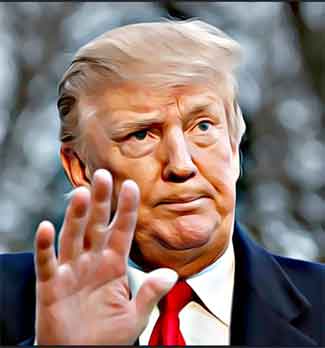
If they have any instinct for self-preservation, Iran and Hamas should be monitoring President-elect Donald Trump's communications very closely these days.
A couple of weeks ago, there was the Truth Social post promising "ALL HELL TO PAY" if Hamas didn't release its hostages by Trump's inauguration on Jan. 20.
"Those responsible," Trump noted, "will be hit harder than anybody has been hit in the long and storied History of the United States of America."
He followed up during a press conference Monday.
When asked what he meant by his prior threat, Trump left it menacingly vague. "Well," he said, referring to our adversaries, "they're going to have to determine what that means, but it means it won't be pleasant. It's not going to be pleasant."
What does that mean? Does Trump have something in particular in mind, or is he making it up as he goes along?
Is he bluffing? Or is he dead earnest?
No one has come up with a Trump Doctrine yet, but a candidate might be: Find out if I'm serious at your own risk.
The most basic thing to note about Trump's threat, though, is that it is the first time an official of the US government — or a soon-to-be government official — has sounded appropriately outraged and harsh about an ongoing crime perpetrated against our fellow citizens.
Trump's "hell to pay" is a throwback to Andrew Jackson or Teddy Roosevelt making it clear that we aren't to be trifled with, and doing it in a clarion tone.
It's been shocking how muted the Biden administration has been about the hostages.
Whereas Trump is expressing a righteous indignation in a thunderous tone, the Biden administration has spoken with all the clarity of a deputy secretary of state summarizing the notes of a three-hour committee meeting.
This style of public negotiation comes naturally to Trump, of course.
His approach doesn't represent any particular foreign policy theory. It's not realist or neo-con or isolationist. It's less Clausewitz's "On War" or Thomas Schelling's "The Strategy of Conflict" than Trump's own "The Art of the Deal."
The famous line is that the Battle of Waterloo was won on the playing fields of Eton; in the same sense, every successful Trump negotiation as president has been won on the playing fields of Manhattan real estate, where Trump first learned his distinctive means of gaining leverage and psychological advantage.
His willingness to escalate and follow through means no threat can be completely discounted, while his sheer unpredictability adds to the difficulty of any foreign actor trying to calculate his next move.
To the famous Machiavellian axiom, "It's better to be feared than to be loved," Trump adds the proviso, "and it's best to keep them guessing, either way."
This couldn't be in starker contrast to Joe Biden, who always fears escalation and is predictably conventional to the point of being sodden and dull.
Trump is what they call in poker a "loose aggressive player," whereas Biden's style is to play a measured game of bridge over tea and crumpets.
The president-elect doesn't like foreign conflict, but he bombed ISIS to smithereens as promised in the 2016 election and killed the top Iranian intelligence official, Qasem Soleimani, without hesitation in 2020.
The safest default is to take him at his word, even if you only — in Trump's words about a threat he says he made to Vladimir Putin in his first term — believe him "10%."
With an eye to the imminent arrival of Trump, there is a chance that Hamas cuts a deal over the hostages in coming weeks, the same way Iran released the captives from the US Embassy in 1980 just as Ronald Reagan was taking office.
Regardless of how it plays out, we are already re-entering a period when enemies of the United States have to be scared or nervous, not knowing how far they can push us, or what will happen if they do.
And that's exactly where Trump wants them.
(COMMENT, BELOW)


 Contact The Editor
Contact The Editor
 Articles By This Author
Articles By This Author